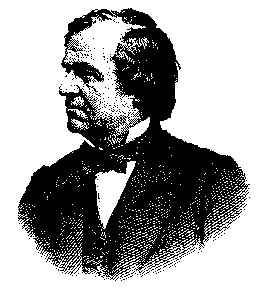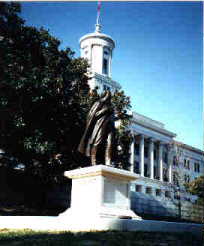 Bobby
J. Demott, 33
Bobby
J. Demott, 33
Knoxville, Tennessee
Faith In The People:
Andrew Johnson, 32o,
President And Mason
 Bobby
J. Demott, 33
Bobby
J. Demott, 33
Knoxville, Tennessee
Tennessee was "in the middle" during the Civil War and, except for Virginia, suffered more than any other state during the period of reconstruction. Geographically, the North met the South in Tennessee; politically East Tennessee was pro-Union; West Tennessee, pro-Confederate; Middle Tennessee was where the two factions met. These feelings have lingered long. Andrew Johnson (pictured), a Democrat from Greeneville, in East Tennessee, served two terms as Governor and over four years as a United States Senator. After Federal Forces occupied a portion of Tennessee, President Abraham Lincoln, on March 4, 1862, appointed Johnson as the state's Military Governor. Actions which he took in this capacity caused much bitterness toward him in Middle and West Tennessee, especially among members of the Democratic Party.
Three Tennesseans, all Masons, have served as President of the United States, and one Tennessee Mason, Samuel Houston, was the first elected President of the Republic of Texas. A statue of Andrew Jackson was erected on the Tennessee capitol grounds in 1880, and James K. Polk is buried there. No public building in Nashville has been named in honor of Andrew Johnson, and no monument to his memory had been erected there until, on October 18, 1995, a statue, a duplicate of the one in Greeneville, was dedicated in Nashville by Governor Don Sundquist.
At the age of 17, Andrew Johnson met Eliza McCardle, age 15, who taught him how to write. A year later they were married. Mrs. Johnson was an invalid when her husband became President. Johnson, an indentured apprentice tailor, never had the good fortune to experience even one day of formal schooling, but as Governor of Tennessee, he was instrumental in gaining the passage of a bill which, for the first time, levied a tax for the support of public schools in Tennessee. He was a strong follower of the philosophy of Andrew Jackson and believed that government should interfere in people's lives as little as possible. As Senator, he sought to keep Tennessee in the Union, and refusing to resign his Senate Seat, he was the only Southern Senator to remain loyal to the United States.
Johnson served about six weeks as Vice President under Lincoln, then succeeded to the Presidency on April 15, 1865. Trying to carry out Lincoln's designs for reconstruction and reconciliation, Johnson encountered immediate opposition with the Radical Republicans in Congress. He wanted to grant amnesty to Southerners and let them organize their own state governments. However, Congress did not agree, and Johnson broke with the Republican party. Congress then proceeded to establish its own form of government in the South, giving rise to the hated "Carpetbaggers." On May 29, 1865 Congress granted general amnesty to many former Confederate soldiers, but, apparently because of some Anti-Masonic feeling, Albert Pike was excluded. However, Johnson, on August 30, 1865, granted amnesty to Pike, who was, at that time, living in Canada.
Having angered the Democrats as well as the Republicans, Andrew Johnson's power in Washington was broken. Impeachment proceedings against him were held from March 13 to May 26, 1868, but the Senate failed, by one vote, to convict him. When he took his seat as a Senator in March 1875, there were fourteen Senators there who had taken part in the impeachment proceedings, twelve of whom had voted "guilty."

Ill. French reported the event to The Supreme Council as follows: "We met the president in the room known as the Library, where he invited us to partake of a lunch. We then accompanied him to his sleeping room, where we conferred the Degrees. Illustrious Brother Johnson expressed himself much gratified and said that the doctrines inculcated were such as he had been preaching and practicing all his life." Brother Johnson was the first President to receive the Scottish Rite Degrees.
An active Mason throughout his life, Bro. Johnson remained a member of Greeneville Lodge No. 119 until his death, and he frequently participated in Masonic functions and ceremonies such as cornerstone layings, for example, at the monument of Steven A. Douglas in Chicago on September 6, 1866. As William R. Denslow points out in 10,000 Famous Freemasons (vol. II, p. 299), "his close association with Freemasonry was one of the factors that led to his impeachment trial. Thaddeus Stevens, the anti-Mason, was a ringleader in the impeachment proceedings against Johnson in 1868."
Brother Andrew Johnson died on July 31, 1875, in East Tennessee. In view of the many attacks upon him from the pulpit, Johnson had requested that no clergy have a part in his funeral, a request that was honored by his family. As he had directed, his body was wrapped in the American flag, which at that time had 37 stars. The first copy of the Constitution which he owned was his pillow. Special trains came to Greeneville carrying people who wished to pay their last respects to the man who had endured more than any other man in history for the sake of the Constitution. The Knights Templar transported the body under an arch of steel to a grave near Greeneville where Brother U. A. Rouser, a mechanic from Knoxville, served as leader of the Masonic burial service. Two years later a monument was erected by his children embossed with these words: "His faith in the people never wavered."